
Related
According to CNN, over 200,000 people protested U.S. plans to invade Iraq at the Vietnam Memorial in Washington, D.C., on Saturday. And in San Francisco, police gave a preliminary estimate of 42,000, but organizers said from 80,000 to 100,000 people took part in the march and rally at City Hall. Rallies were also staged in cities across the country, from New York to Boston to Madison, Wisconsin. Today on Democracy Now!, we hear from historian Howard Zinn, activist Medea Benjamin and others who are saying “No!” to war.
Transcript
AMY GOODMAN: We turn now to the protests that took place this past Saturday in Madison, Wisconsin, where more than a thousand people gathered, Will Williams addressed the crowd, a two-term Vietnam vet and great-grandfather of four.
WILL WILLIAMS: About 40 years ago, I joined the U.S. Army to escape the hard times in poverty in Hard Times, Mississippi. Two years later, Lyndon Johnson signed the resolution, the Gulf of Tonkin Resolution. A few weeks ago, the Congress sold out and signed Bush’s new resolution to go to war with Iraq.
I’m speaking not as one that is advised by advisers as Bush is, but one that physically shed blood on the battlefield in Vietnam, for a cause at that time that I thought was just. After my first tour, when I came back to the United States, I faced protesters, which I didn’t understand and didn’t know what was going on. So I put in a 1049 to go back to Vietnam to escape the protest. The last time I came back, I began to research and find out the policies of this country and why people were protesting. And that’s why I’m on a battlefield today with you to follow another war.
We could not win our War in Vietnam. It was unwinnable. But we can win this war today, because this government belongs to the people. And I believe that we will take it back from the people that are controlling it.
I’ve also been called unpatriotic because of my stand for what is right and what I believe. And I dare anyone in Bush’s administration or anywhere to challenge that patriotism. I did what my country ordered me to do, because I was in the military. But it was not right. And years later, Bob McNamara, the secretary of defense at the time I was there, even spoke out and said Vietnam was a mistake. And I tell you now: Iraq is a mistake.
Iraq is not the imminent danger to America. This administration is the imminent danger. Those very rights that I fought and bled for have been denigrated by the PATRIOT Act that this Congress laid down and let it pass. And we want those rights back.
In order to kill in a war, you have to be able to strip the human face from a person. I did that. And since then, I’ve seen human faces. I’ve even seen the faces that are stripped, and I live with it every day and every night.
War is more than just going and killing somebody, for whatever reason. And this reason is all, and all alone, power. This administration tell us how dangerous nuclear weapons are as a threat. Why are we proliferating? Why did George Bush break a treaty with Russia that had been standing for years? I don’t believe in nuclear weapons, either. I don’t feel that anyone should have it. But if this country can have it, then every country should have it, because without it, there is no balance of power, and we end up with imperialism or dictatorship. And that’s the course that we’re traveling.
In ending, I have a song I want to give to George Bush and his followers. And you might remember it from years ago, and the people would say, “To the people.” [singing] You got to give the power to the people. You got to give the power to the people. You got to give — what? The power to the people
AMY GOODMAN: Vietnam veteran Will Williams, speaking to a mass gathering in Madison, Wisconsin. And as we make our way up the East Coast, we go to Boston, Massachusetts, where Howard Zinn addressed a Boston speakout against the war at Boston University. Howard Zinn, radical historian, author of A People’s History of the United States.
HOWARD ZINN: … who are America, listen to them. We’re not putting them down. We’re putting down the makers of war. We’re putting down the people who are stealing the wealth of this country and using it for military purposes, while there’s not enough money for medical care, there’s not enough money for housing. I mean, you read the papers, and you see there’s 6,000, 8,000 people in the city of New York who are sleeping on the streets or in shelters. And California is going through a medical crisis. There’s no money to give people the basic things of life. And there is all of this huge sums of money going for war? I mean, something is fundamentally sick about a society that does things like this. And so, those are the things we have to point out.
A few general points about war. War is always — you know, people go, “just war,” “unjust war,” “this is a good war, that’s a bad war,” this — “yeah, let’s, you know, examine this war,” so on. I had a student who wrote a paper about war, and she said, “War is not like wine, where you have a good year and a bad year, and, you know, a good war and a bad war. No,” she said, “War is like cyanide: One drop and you’re dead.” And yeah, war is always the indiscriminate killing of large numbers of people for dubious purposes, really. And in war, the means are always horrible and certain. The end, even when it’s presented as a good end, is always uncertain. And therefore, war inherently cannot be justified as a way of dealing with the problems we have in the world.
Just one more thing. Well, you always have to be aware, when a speaker says, “Just one more thing,” they usually don’t mean it. When people speak, will say, “And in conclusion,” and then go on for another hour, you see. But we’ll see if I mean this. Test of my own integrity.
To go to war means, whether it’s the war against Iraq, war against Afghanistan, go to war anywhere, means that you do not consider the lives of other people as important as the lives of the people in your country. It means that you don’t consider that the children of Iraq have an equal right to life as our children. Just as when we dropped the bomb on Hiroshima and Nagasaki, we were saying the children of Hiroshima and Nagasaki do not have the same right to life as our children. That’s what war means. And it’s important to confront that and to confront other people with that, because most people really believe that, yes, human beings are equal, human beings have an equal right to life. But when you make war, you are saying, no, they do not have the same right to life that we do. If we believed that people have the same right to life, we couldn’t make war. If we believed that the people in Africa and Asia and everywhere else have the same right to life, liberty and the pursuit of happiness as us, we would be taking these billions and billions of dollars for war, and we’d be using it for medicine and food. And we would no longer be a military superpower, which is a disgusting thing to be, really, and we would become a humanitarian superpower in the world and, yes, and do something to change this century from the way things were last century. Thank you.
ANNOUNCER: Join me in welcoming Medea Benjamin!
AMY GOODMAN: [inaudible] to Medea Benjamin. This is Medea Benjamin of Global Exchange.
MEDEA BENJAMIN: Raise your hand if you’re a parent. Woo! Raise your hand if you’re a grandparent. Whoa, one right here. Just think of what’s happening right now. We have a president that is sending the ships, sending the war machine, sending the bombs, sending the troops. And look what we have growing here at home: a mass beautiful movement that’s going to stop them from dropping those bombs. And we’re part of a mass beautiful global movement, on the streets in Italy, on the streets in France, on the streets in Australia, in Egypt, in Tony Blair’s England. We are the majority of the world’s people, and we are going to stop George Bush. And look what we’re building in responses to Bush all for war. We are building a movement for solar, for wind power, for public transportation, for bicycle power.
And I want to talk to the women here. Raise your hand if you’re an unreasonable woman. We have a new group called Unreasonable Women for Peace. And on November 11th, we are going to launch, on Veterans Day, in honor of the veterans saying the best way to honor the veterans is to work for peace — we will launch a hunger strike in front of the White House. Every day, seven days a week, we will be out there in front of George Bush. We need you with us. We need you unreasonable women to join us. We need to stop the testosterone poisoning of our globe. We need to stop the lethal combination of oil and testosterone. We, the women, have to come forward and say, “While George Bush is saying to the world that the U.S. military is going to go anywhere it wants and change any regime it wants, we, the women, in a nonviolent, grassroots, beautiful way, will step forward.” And what do we say? Regime change begins at home. Regime change begins at home. Regime change begins at home. Regime change begins at home. Join us November 11th, hunger strike in front of the White House. Power to the peaceful! We love you!
ANNOUNCER: Thank you. Thank you. Well, folks, we’re almost ready for that time. Look, let me just say one thing. A little housekeeping things here. We’ve got plenty of literature tables out there. Please go out, visit the literature tables that we have out there. Also we have —
CLARENCE THOMAS: Brothers and sisters, on behalf of the ILWU, the International Longshore and Warehouse Union, in San Francisco, I bring you greetings and solidarity, because you are the fighters, the true fighters for social justice and peace. In keeping with our progressive history, we are one of the first unions to come out against the war, because we say no new war against Iraq, no blood for oil, no death to innocent Iraqi people, in particular women and children, no colonial occupation of Iraq, no taking control of their oil fields. If there is a regime change in Iraq, let the Iraqi people make the change, and not George Bush.
Brothers and sisters, as you all know, the ILWU was under assault by not only the Pacific Maritime Association, but also the Bush administration. You have to understand one thing. The ILWU is the union that refused to unload cargo emanating from South Africa, that set into motion a chain of events that brought down apartheid. We are the union that shut down the port in 1999 in support of the WTO. We are the union that shut down the port in 1999 in support to free Mumia Abu-Jamal.
Brothers and sisters, the war on terrorism has a component. It’s the war against our rights, a war against our civil liberties. The U.S. PATRIOT Act, which locks up immigrants, who are not terrorists, taking away their rights. Homeland security — homeland police over our — over our free American citizens. Port Maritime Security Act, which treats maritime workers as if they’re potential terrorists. The Bush administration has promised to use the military to load and unload cargo in the event of a strike. And we say this to George Bush: Hands off the docks! Stay out of Iraq! Join me in this chant. Hands off the dock! Stay out of Iraq! Hands off the dock! Stay out of Iraq! Let me hear you!
CROWD: Hands off the dock! Stay out of Iraq!
CLARENCE THOMAS: Let me hear you!
CROWD: Hands off the dock! Stay out of Iraq!
CLARENCE THOMAS: Hands off the dock! Stay out of Iraq! An injury to one is an injury to all! Thank you!
AMY GOODMAN: Professor Howard Zinn addressing a Boston speakout against the war at Boston University. And that does it for today’s program. If you’d like to order a video or audio of today’s program, you can call 1-800-881-2359. That’s 1-800-881-2359. Our website’s democracynow.org. Democracy Now! is produced by Kris Abrams, Mike Burke, Angie Karran, Ana Nogueira and Alex Wolfe. Mike Di Filippo is our engineer and music maestro. Special thanks to Angela Alston. I’m Amy Goodman. Thanks for listening to another edition of Pacifica Radio’s Democracy Now!

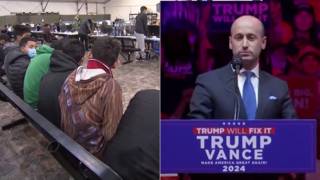
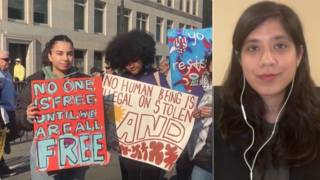
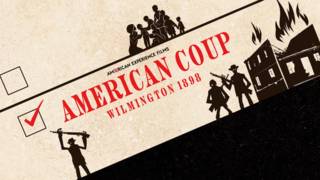
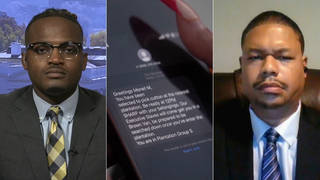






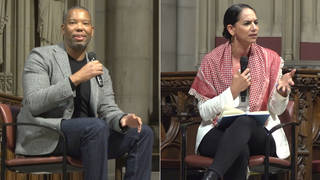
Media Options